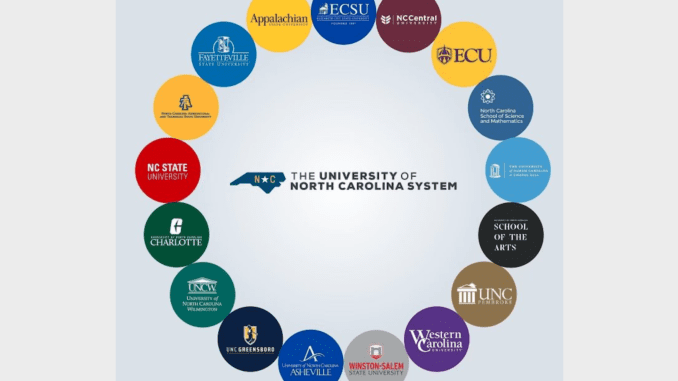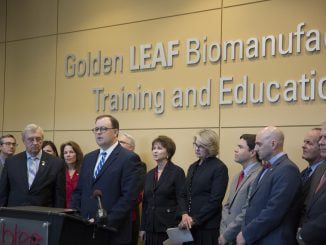
RALEIGH —UNC System President Peter Hans recommended keeping in-state tuition unchanged for an eighth consecutive year, he told the UNC Board of Governors on Sept. 14.
In 2016, the Fixed Tuition Program freezing tuition at UNC schools was established, stating all in-state undergraduates entering as a freshman at any UNC System institution will not see tuition rates go up for eight consecutive semesters of enrollment.
“In real dollars, that means tuition at our public universities is lower today — and will be lower next year — than it was at the end of the Obama administration,” said Hans. “At our four NC Promise schools, it’s dramatically lower today than it was eight years ago. There’s not a single other state in the country that can claim a similar achievement, and I would like to see us extend this remarkable run to a full decade.”
Under the NC Promise program, tuition is capped at $500 a semester, or $1,000 a year, for undergraduate in-state residents. NC Promise Schools are Elizabeth City State, Fayetteville State, University of North Carolina at Pembroke and Western Carolina.
Not including fees and other costs, the in-state tuition average range at the other UNC System schools is around $4,500 to $4,700. The most expensive UNC institution is UNC Chapel Hill at $7,019, followed by UNC School of the Arts at $6,497 and NC State University at $6,535.
Per agenda materials for the board’s Committee on Budget and Finance, real‐dollar tuition and fee rates when adjusted for inflation have fallen $1,360 since Fiscal Year 2014, which includes a drop of $860 at non‐Promise institutions.
The committee’s documents also showed in-state student debt at the time of graduation having fallen from 63% in 2016-17 to 55% in 2021-22. It is unclear if lowered enrollment following the pandemic has had an impact on the student debt figures. The 2022 enrollment report showed declines in 12 of the 16 schools for the first time in nine years.
Some members of the budget and finance committee had concerns about the continued tuition freeze and the impact on revenues, with member Joel Ford, a former state legislator, remarking that UNC schools were having to “essentially tighten their belts, find efficiencies, make adjustments in order to stay in line with their flat revenue stream.”
Hans said he had spoken with each of the chancellors in the system and that none had any concerns about continuing the freeze. He also said lawmakers have filled the financial need by increasing funding.
“Over the past two years, we’ve received generous increases from the legislature. We’re very optimistic again about increases this year and next as well,” said Hans. “So, that would meet that largest obligation that we have to our faculty and staff through compensation from the state.”
Keeping in-state tuition frozen for at least a decade is something Hans said he would like to see happen. To balance out revenue gaps, the board will review requests from the various institutions to increase out-of-state tuition for undergraduates and graduate students. Additionally, fee increase proposals will be accepted by the board for review, but those requests can’t be more than 3% over the previous year’s fees.
Hans also addressed the “ever-rising college costs” of a college degree that have “done real damage to the students we need to reach in order to fulfill our mission.”
“Poor and working-class families too often get the message that college is out of reach, that college debt is crushing, that degrees don’t pay off,” said Hans. “We need to say loudly and clearly that in North Carolina, that simply isn’t true.”
“Not only are we holding the line on college costs; we’ve made huge progress on student debt. Far fewer of our students are borrowing to attend college, and those that do are borrowing less today than they did three years ago. We need families across our state to hear that good news.”
Hans also addressed the “falling confidence in colleges and universities,” and that there needed to be paths that don’t require a degree.
“Now, I have said loudly and often that college cannot be — and should not be — the only path to success,” Hans said. “We need good jobs and high-quality training programs that don’t require a degree, at least not immediately, and we need to do far more to help working adults find new opportunities as the economy shifts and their aspirations change. America is a big and dynamic country, much too big for a single path to a good life.”



